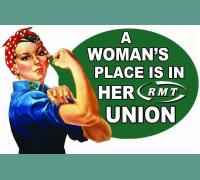- This article is taken from RMT Bakerloo News which can be read here.
The death of Sarah Everard and arrest of a serving police officer on suspicion of murder, and the subsequent police repression of the event organised in her memory, has sparked renewed organisation among women members of RMT in London Transport Region.
Many women activists were frustrated that the union made no statement nationally to mark International Women’s Day, and only commented on the heavyhanded policing of the vigil after being forced to by pressure from women members.
Regional Organiser John Leach facilitated a meeting of women members which was a positive step in the fight against sexual harassment, violence against women, and sexism in general - at work, in wider society, and in the union itself.
RMT Bakerloo branch was represented at the meeting by our branch chair, Mel Mullings, and our women’s officer, Sarah Russell. The meeting produced a charter of demands to improve women’s safety in the workplace, which has been presented to London Underground.
Demands included:
- Safe transport to and from work, including door-to-door taxis
- No lone working
- Adopt a domestic violence policy based on union proposal
- Serious and confidential handling of complaints
- For the full list of demands, go to bit.ly/rmtwomen-demands
In the meeting, women discussed their experiences of sexism, including within the union, where a male-dominated culture can sometimes prevail. Several activists also discussed the importance of an intersectional approach to the fight for equality, which looks at the intersections between different forms of oppression and inequality. This means ensuring that the voices of black women, other women of colour, trans women, and other women who face specific marginalisation are heard loudly.
Although the death of Sarah Everard has rightly brought many issues around women’s safety to greater attention, the fact that there was not as high-profile a response to similar killings of black women such as Blessing Olusegun in October 2020 higlights the need for an intersectional, anti-racist approach. Conversations about oppression and inequality can sometimes be difficult. But they are absolutely necessary. Organising to confront oppression is not about blaming individual white people for racism, or individual men for sexism, but analysing systems of oppression and discussing how we can confront them. As a union, we will also always seek to understand how racial, gender, and other inequalities link to class exploitation, via gender/ethnicity pay gaps and policies such as outsourcing which systematically disadvantage predominantly female and BEM workforces.
RMT women will continue to meet to organise around this issues. For info on the meetings, please contact your rep or branch officers.
- 2374 reads





